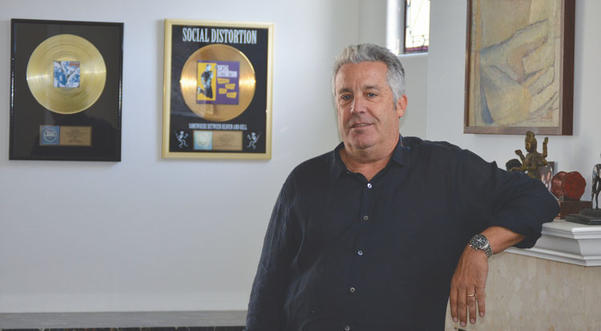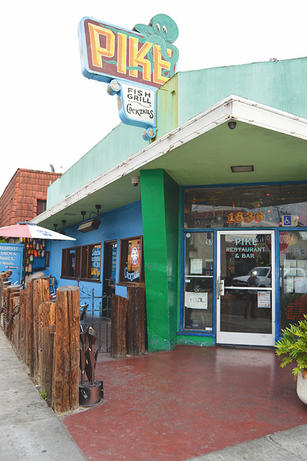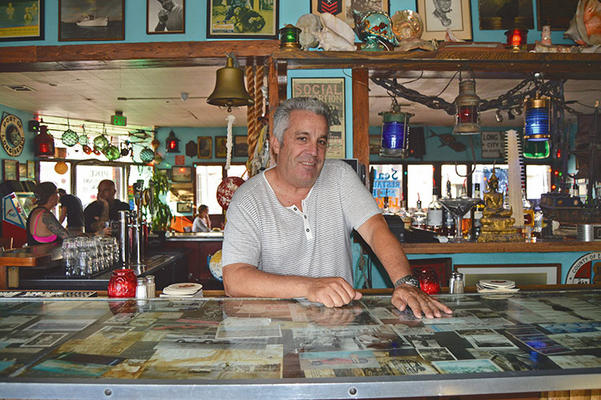Seven days a week, every pint of beer served at the Pike Restaurant & Bar is presented in a glass decorated with a hat-wearing, cigarette-smoking, martini-swilling skeleton – the unmistakable logo of longtime punk rockers Social Distortion.
“It’s kind of a universal logo – people have tattoos of it, a lot of street art. They don’t mind that I put that on there. It just promotes their band,” Chris Reece, owner of the Pike and former drummer of Social D (as the band is commonly known), said. “We did it one Halloween, we put some on, and everybody liked it so much that we kept doing it. What other kind of logo would you put on a glass to drink booze out of, ya know?”

During his time as Social Distortion’s drummer, Long Beach restaurateur Chris Reece recorded two Gold records: “Social Distortion” and “Somewhere Between Heaven and Hell.” Reece has the awards hanging in his Long Beach home. (Photo by the Business Journal’s Larry Duncan)
Born in San Francisco in 1959, Reece grew up in the ’60s with his antique-selling, hippie parents. He described fixing up timeworn items with his dad and helping his parents sell them in the Mission District of the city. Laughing, Reece said, “I was a little too young to experience the Summer of Love, but I was there.”
In junior high, Reece played drums in the marching band and said he enjoyed it well enough. He explained how he grew up listening to a lot of wild and crazy drum solos from various drummers, but when the Ramones came out with Tommy Ramone behind the kit, they changed the way he viewed the instrument. He said they simplified the instrument and showed that anyone could do it.
The first opportunity for Reece to play shows with a band came when he joined The Lewd in 1981. He was 22 years old. It was during this time that he would meet and become friends with Mike Ness and the other members of Social Distortion.
“We became friends because we would get them shows in San Francisco and they would get us shows in Orange County,” Reece said. “In those days, it was a small network – everybody slept on each other’s floors when they came to town. There wasn’t a lot of money in it, nor did we think it was something that was going to last as long as it did.”
In 1983, after two years with The Lewd, Reece quit the band. The following year, while living in Hollywood, Ness asked Reece if he would join the band after its fourth drummer, Bob Stubbs, left the group.
According to Reece, prior to his joining, the band was at a stalling-out point after its “Another State of Mind” tour, which “fabulously fell apart” and was made into a documentary that followed Social D and Youth Brigade on tour. The following year, the band released its first studio album, “Mommy’s Little Monster.” It was less than a year after the album’s release that Reece joined the group.
“Mike Ness was a junkie at the time and was in a bad way, but it was a great band,” Reece said. “Why I joined a band with somebody like that, I couldn’t understand, except for the fact that he was an amazing guitar player and showman. He finally turned his act around and cleaned his act up a bit later, but the beginning was certainly touch-and-go.”

Chris Reece opened the Pike Restaurant & Bar on the corner of 4th Street and Hermosa Avenue 14 years ago. His location is known for offering live music seven days a week without charging a cover for entry. “The musicians that play here enjoy our crowd because our clientele are music lovers, they’ll applaud for music, they’re not ‘too cool,’” Reece said. (Photograph by the Business Journal’s Larry Duncan)
During his 10 years as the drummer for Social Distortion, Reece said the band toured relentlessly unless they were recording an album. Reece recorded three albums with the group, including “Prison Bound,” “Social Distortion” and “Somewhere Between Heaven and Hell.” The latter two albums were both certified gold (for sales of 500,000 units), and Reece has the awards hanging in his home in Long Beach.
Of all the experiences of being in a touring band – including nonstop nationwide tours, frequent tours in Europe and even venturing down to Mexico – Reece said the band’s tour with Neil Young & Crazy Horse through Canada and some of the states stands out most.
“Hanging out with Neil Young & Crazy Horse on a daily basis is something that’s kind of hard to top in rock ‘n’ roll,” Reece said. “That was probably the highlight of my rock career. I learned a lot from those guys about music, the music business and life. It was a great time.”
After a decade with the group, Reece left the band in 1994. He explained that there comes a point in music where something that started as a hobby becomes a job. Reece said he was tired of living out of a suitcase and that there isn’t much of a life outside of touring, which is fun when you’re single and in your 20s but can eventually become grueling.
Reece had moved to Long Beach while with the band, which would rehearse near 7th Street and Alamitos Avenue in a little TV repair shop. Once he left the group he became an antiques dealer, taking after his parents. He said that his knowledge of antiques got him by in the pre-Internet age of the mid to late ’90s, since the Internet didn’t go full mainstream until around 1999 and the first mainstream smartphone wasn’t available for several years after that.
Reece married in 1996 and quickly had three sons. The oldest is now 19 years old and an engineering major at UC Santa Barbara, the middle son is 17 and a senior in high school, and the youngest is 15 and plays drums for his school’s jazz band.
Along with selling antiques, in 1999 Reece began making a map of every antique shop in Long Beach, most of which are located on what is now known as Retro Row along 4th Street. During his interview with the Business Journal, Reece said with a straight face, “If you want to ask me who named it Retro Row, you can go ahead and ask me.”
When asked, he simply responded with “I did” and laughed.
His antique map, called Reece’s Antique and Retro Shoppers Map, is still published quarterly and has expanded to include maps for Los Angeles; Orange County; Palm Springs and Riverside; San Diego County; San Gabriel Valley; Santa Barbara, Ventura and Central Coast; High Desert; Salt Lake City, Utah; and Southern Utah.
In 2002, when the owner of an old 1950s diner passed away, the doors were chained up. Reece explained that at the time no one really wanted to buy property in the area because it was a bad area. But where others saw a neighborhood past its prime, Reece saw opportunity. He bought the property and turned it into the Pike Restaurant & Bar.
“I kind of always thought it would be fun to have a restaurant and bar – it’s just one of those stupid guy fantasies,” Reece said. “It was a slow process, but I always thought the bar business could be lucrative. I’ve played in enough bars to know that there’s money to be made in booze and food.”
Nowadays, the Pike is known for having live music – bands or DJs or other forms of entertainment – seven nights a week without charging a cover for entry. However, Reece explains that this was not easy to achieve, as the city was not always pro-music. He said it was a battle to obtain an entertainment license and to get his patio approved, and it took a long time to receive his conditional use permits.
“They didn’t really want music – they were scared of it,” Reece said. “There was really different politics at the time and it was left over from the Puritan Iowa-by-the-sea politicians who were afraid of any music. Now it’s changed. It’s easier and they seem to have realized the benefits that it brings to the community.”

Former Social Distortion drummer, Chris Reece, pictured in his Pike Restaurant & Bar, said when he bought the property in 2002, the City of Long Beach was not receptive to his idea of having live music. “They didn’t really want music – they were scared of it,” Reece said. “There was really different politics at the time and it was left over from the Puritan Iowa-by-the-sea politicians who were afraid of any music. Now it’s changed.” (Photograph by the Business Journal’s Larry Duncan)
With the change in the city’s mentality over the last decade, Reece noted that many more businesses possess an entertainment license and offer live music. However, he said that just because a business has the license doesn’t mean they know how to book the right bands. He explained it’s something he acquired through years of being a musician and being able to recognize a good band from a bad band.
“You put the wrong band in there and they can clear the place out if it’s a bad experience for people,” he said. “Maybe they’re too loud or out of tune. We’ve always been able to get quality musicians in here without having to charge a cover, that’s the trick. But the musicians that play here enjoy our crowd because our clientele are music lovers, they’ll applaud for music, they’re not ‘too cool.’”
In 2014, Reece decided to expand his business and take the Pike concept to Los Alamitos. However, he said he quickly realized that a concept like his would not work in a sleepy suburban town that just wanted a sports bar with weekly trivia and karaoke.
“This place exists and is what it is because of the location, because of the mix of people and the density of this neighborhood and the type of people that live [here],” Reece said. “It’s a very unique neighborhood, so we decided that we would just stick with this one and make it happen.”
While businesses nationwide continue to recover from the Great Recession, it’s still common to see smaller businesses close their doors in the wake of large corporations and a continuing shift to the convenience of online shopping. Much like with the music industry, Reece does not think the Internet is helping the small business world, but he isn’t worried about his own.
“I think the Internet has definitely changed a lot of businesses. It’s killing Main Street, USA,” Reece said. “It’s hurting these shops now. Lucky for me, I’m selling something you can’t buy on the Internet – an experience.”
